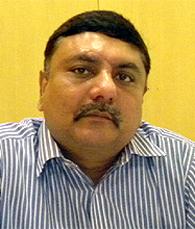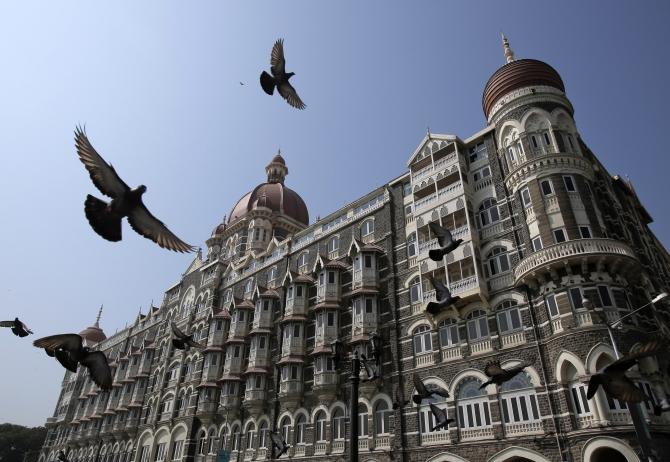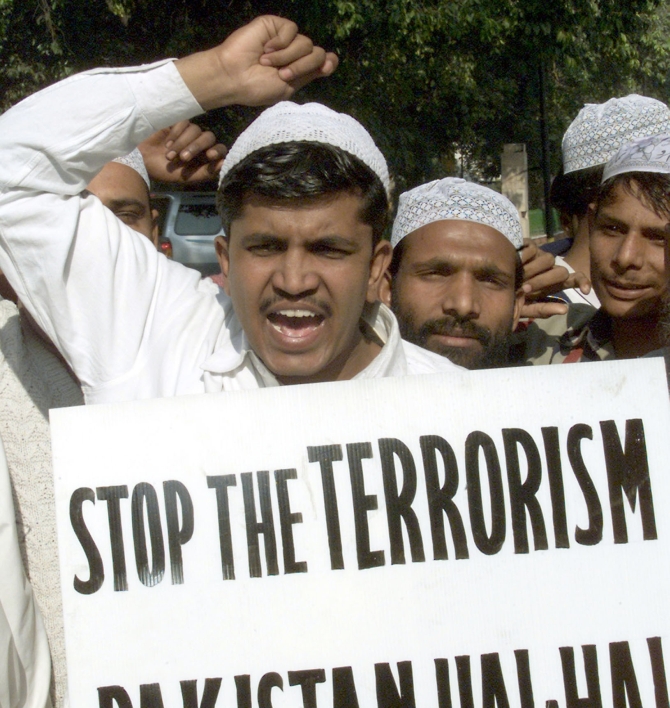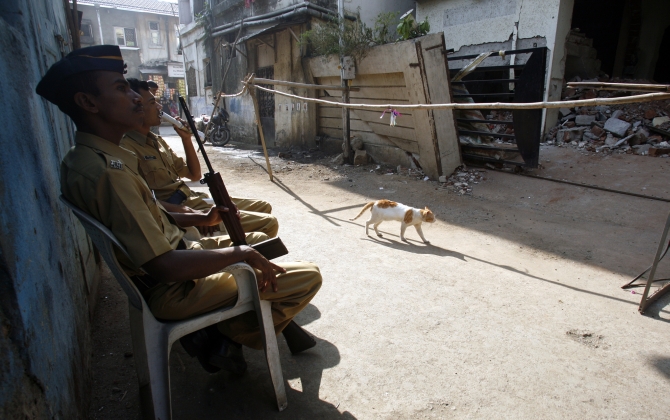 | « Back to article | Print this article |
26/11 hero: 'That night had a deep impact on me as a human being'
'Apart from that is a kind of feeling, to be very blunt: Ki tera baap ka ghar hai ki koi bhi aake, sala, kuch bhi karke chala jayega (is it your father's house that anyone can come, do anything and go away)?'
'Anger with frustration. And a feeling that had we, at that point of time, had some weapon, or a grenade, perhaps then it would not have taken three days for us to end the operation).
Rajvardhan, the unarmed police officer who took on terrorists at Mumbai's Taj Mahal Hotel on this day five years ago, speaks to Rediff.com's Vaihayasi Pande Daniel in the concluding part of a three-part exclusive interview. Rajvardhan's (left) admirable role in holding the terrorists at bay at the Taj in the first 24 hours with his Indian Police Service batchmate Vishwas Nangre-Patil and a few policemen not used to terrorism of this proportion, has been celebrated in The Siege: The Attack on the Taj by investigative journalists Adrian Levy and Cathy Scott-Clark.
Rajvardhan's (left) admirable role in holding the terrorists at bay at the Taj in the first 24 hours with his Indian Police Service batchmate Vishwas Nangre-Patil and a few policemen not used to terrorism of this proportion, has been celebrated in The Siege: The Attack on the Taj by investigative journalists Adrian Levy and Cathy Scott-Clark.
The book compellingly profiles the enigma named David Headley, the double agent who helped the Mumbai attacks, and the impudent manner in which he was allowed to function by his American handlers.
It details the manner in which the Pakistan-rooted terror outfit Lashkar-e-Tayiba operates. The Siege also vividly, and uncomfortably, draws attention to the paralysis of the Mumbai police force in those 68 hours.
The emphasis on the deficiencies of the police force, the institution he has devoted his life to, does not sit well with Rajvardhan, who has read three-fourths of the autographed copy he received from Levy.
The existence of a Delhi-based mole for Pakistan's Inter Services Intelligence directorate, codenamed Honey Bee, and the terrorists's accomplices in Mumbai, the chuhas (the mice), who provided on-the-ground assistance, are other startling revelations of The Siege.
Part I of the interview: The unarmed cop who took on 26/11 attackers
What do you think of The Siege in which you feature?
What I can tell you is, that for a person who was a part of this, I don't feel much about this book.
The only thing that was interesting to me was that Headley thing because we were not (very) aware of it.
I believe Levy has picked it up from Headley's interrogation report, which we had no access to.
Apart from that many of (my) quotes and the mood of mine, that he has quoted, it appears (smiles) that he has slightly dramatised some of the thoughts.
But the facts are correct the way he has mentioned (them). I will not doubt that. He has come to me, like you have come. He sat with me for a long time and then he did a follow up also.
Part 2 of the interview: 'There are more than 115 targets in Mumbai city'
My senior colleague Sheela Bhatt interviewed Adrian Levy. It has emerged that what Levy said in the book has not gone down well in the Indian establishment. What is the general reaction to this book?
Details about some Honey Bee, in Delhi, have come out in the media. A double agent, which, if Levy is aware of, we all feel that now is the time when it should be revealed.
If the US intelligence is aware of a Honey Bee --- or there is something that has been revealed, I believe, by Headley -- it should be revealed. Or maybe it might have already been revealed to the correct authorities. So we as a layman reading this book (would) have that kind of perception.
Definitely in this book they have tried to show that the police, at that particular point, was not capable of handling this kind of a terror.
...Many a time a fact, which may be a bitter truth, but is the truth, has to be accepted.
Not only accepted but we should build upon our weaknesses and move forward.
So I personally don't feel -- if you ask me as a reader of this book and a participant in the event, which happened --- I don't feel that he has in any way belittled us. I will not say that.
There will always be two views, it seems. If you should listen to someone in American intelligence establishment they will say the Indians were foolish to not have picked up all the hints they were sending of terror alerts for specific targets.
If you were to speak to someone in the Indian intelligence they will say the Americans should have revealed that there was this double agent, which was apparent very early…
I will answer this by a simple, different kind of question to my American friends who will be reading this (book) in America.
There were sufficient hints before 9/11 (about a 9/11). This is common knowledge. Everybody was aware that something like 9/11 was going to happen in the US. There were hints that planning was going on. Even the CIA and others had picked up hints from the Philippines, and other places, about some work going on.
But still, using your terms, they were foolish enough not to prevent it.
So information coming in tidbits doesn't always give the whole picture.
But, in this particular case, if you go with what the book has written, about Mr Nangre Patil, sufficient warning was given to the Taj.
This is happening not only in India. It is a global problem. (It is about) securing places where you have high footfalls. There is a conflict between business interests, security interests and a person's (the customer's) own privacy.
There has to be a balance which has to be (effected)... Now the time has come for each one of us, everywhere, to understand, (especially) after what has recently happened in Kenya (in the Nairobi mall) and other places, that these are the future target places.
Because these are the places that if they become a target there will be more hue and cry. If you go and shoot in any of the army cantonments it will not raise that kind of public anger.
Kindly click NEXT to read further...
Buy The Siege: The Attack on the Taj here
'Honey Bee could be anybody sitting in Pakistan embassy'
Wasn't it very apparent, shortly after 26/11, especially when you check out the location of the Jewish Chabad House (one of the attack points), that even a long-term Colaba resident like me did not know of its existence, that there had to have been a David-Headley-kind of figure who provided such information?
At that point of time it was not so apparent. Apart from Chabad House the other (targets) were very accessible and easy to come and go to.
But even entry through Machimar Nagar, where the ten terrorists landed, was a hard one to figure out?
If you look at the coast (it would be obvious) and by GPS it is not so difficult to land there.
How would terrorist Ajmal Kasab and his group have known about it on the ground level?
But (David) Headley had recce-ed it.
But no one knew about Headley at that time. Headley came up later.
When 26/11 happened, and immediately thereafter, there were write ups in the Indian media saying there could be some insider.
But the police said no. I remember (then joint commissioner of police) Rakesh Maria saying no.
I was not part of the investigation. But in any perspective we all went with Mr Maria because he had Kasab. So there was a person living and talking. Maybe we all went with him because he had a more authoritative version.
How could the police investigating team at that time believe the terrorists could get to the very inaccessible, less-known, Chabad House without additional pre-help?
Because Kasab, at that point of time, said it was only done by GPS.
He kept insisting?
Yes.
He never indicated otherwise?
He said we all came by this route. We all landed here. We were all aware who has to go where.
And he didn't know about Headley?
No.
At what point for you, speaking not as a police officer, did you think that there was more to this story?
We had intelligence earlier that the Taj has been recce-ed. That the Taj was on the terror list. Anybody, a tourist, can come and see where the Taj is and give a photograph. Anybody can give a photograph of the Trident to anybody. Right?
What do you think about the existence of a Honey Bee?
He is talking about a Honey Bee passing to them a drill manual, and other things, like how the Indian police functions.
But you will find most of these are already on open Web sites. How you take a drill and how you do an SOP.
If you go backwards you will find that, at many other times, ISI-affiliated spies have been picked up, from the rest of the country, who have been found passing this kind of information to their handlers in the Pakistan embassy (in Delhi) and elsewhere.
So Honey Bee could be anybody sitting in the Pakistan embassy.
Kindly click NEXT to read further...
'If we had a weapon or grenade, it wouldn't take 3 days to end the siege'
So in your view Honeybee may not exist?
I can only speculate. He may exist. But the issue is --- that if he exists, and this information is with some intelligence agency, they should pass it on.
Because he has potential to be dangerous in the future? ?
Yes, which we as a general public may not be aware.
Honey Bee, if he exists, seems to be in Delhi. What about the chuhas? They must be still loose and they must be in Mumbai.
You cannot deny it. There may be somebody who could be in Bombay. How can you deny it? There is a possibility. You never know.
Was there anything today, now in retrospect, that you can say could have prevented a David Headley from operating the way he did, since you mentioned, based on your work at the Foreigners Regional Registration Office, it is hard to keep track of every tourist's innocent movements.
Was there anything about what he did, during his recces, that should have been noticed?
One threat could have been (and should have been noticed) was that he had hired an office in Tardeo (central Mumbai) for immigration where he was recruiting labour...
Probably a foreigner coming here and doing that kind of business (alone), instead of tying up with an Indian agent, who would normally supply labour to him, on a commission basis should have given some kind of (warning) that we should see that what is he up to.
You are now part of the economic offence wing of the Mumbai police, as additional commissioner, and no longer directly in touch with the issues around 26/11. But as a police officer what are the frustrations that you feel with the system?
The entire incident, which happened that night, had a deep impact on me as a human being. For a very long time.
Personally, I went through psychological trauma.
Secondly, was the feeling of helplessness, at times, for not being able to save so many lives which, as a policeman, we should have saved.
I am not talking from a high pedestal --- that I am Mahatma Gandhi (a photograph of Mahatma Gandhi hangs on the wall behind him in the British era-police headquarters opposite Crawford Market). I am trying to share with you my inner feelings. You may feel that I am trying to be over smart or something.
But there is a sense of frustration, as a policeman, because you feel that these people are relying on you. They are looking up at you. And at that critical moment, if you are not able to save them then that feeling, inside, of not being able to do your duty --- it is there.
Apart from that is a kind of feeling, to be very blunt: Ki tera baap ka ghar hai ki koi bhi aake, sala, kuch bhi karke chala jayega (is it your father's house that anyone can come, do anything and go away)? You know that kind of a crude feeling.
Anger.
Anger with frustration. And a feeling that had we, at that point of time, had some weapon, or a grenade, perhaps then it would not have taken three days for us to (end the operation).


